He was there, a young student activist in a crowd of thousands of people. He knew he was ready. Thailand needed a change, and he was to be part of it.
Kiattichai ‘Big’ Tangpornphan, made his way to the front of the crowd, his heart pounding. The sound of thousands of people roared as he held the microphone. Resistance was in the air.
“The King is not a God. He can be criticised,” he spoke into the microphone, as the crowd cheered.
He believes this specific line that he uttered in public is what could ultimately put him in jail. That was his debut as a democracy activist.
The 23-year-old International Relations student at Thammasat University, Bangkok, has been calling for change for two years. First, in late 2020, when he urged the government to revise Article 112 of the Criminal Code, royal defamation or lèse majesté. He also voiced his criticism of the current Thai King Maha Vajiralongkorn, for exercising power from his residence in Germany, leaving Thailand’s legislative system stalled until his return.
But that was just the beginning. The young activist was further accused of royal defamation in 2021 when he compared the current King to King Phrapokklao, or Rama VII, mentioning that the latter was the most democratic King in Thai history for accepting a new democratic constitution and appointing himself as Constitutional Monarch.
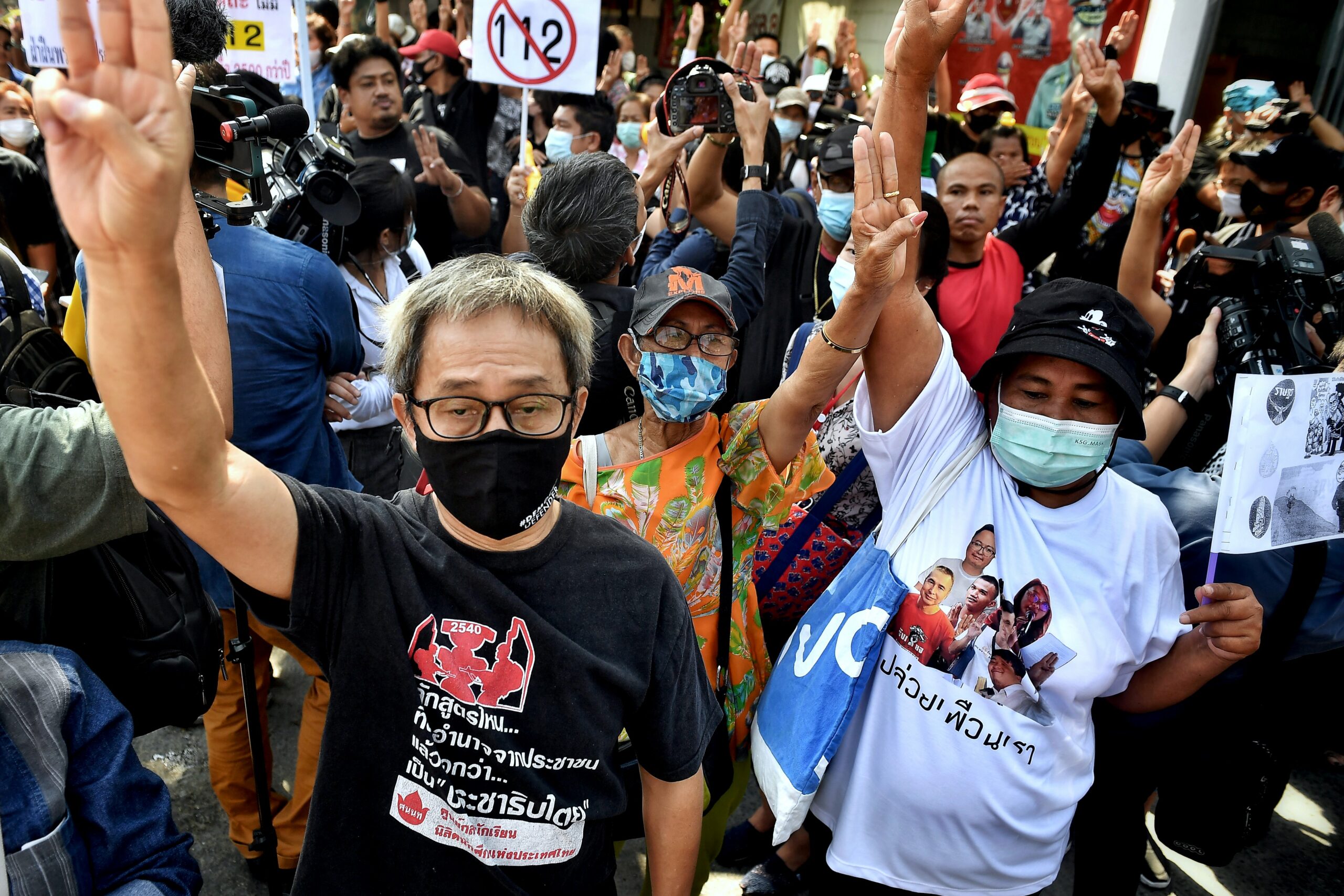
After giving this speech, Kiattichai was accused under Article 112. He remembers the moment the police strapped a 300g ankle bracelet with a GPS, 3G/4G, and radio frequency (RF) linked to his home.
The device has drastically changed his life.
Kiattichai is just one of numerous young Thai university students whose hopes and dreams have come to a halt. Accused of royal defamation, many of the key leaders of the anti-government movement are facing more than 100 years in prison.
Today, they struggle to live normal lives. Subject to continuous legal hurdles and forced to wear Electronic Monitoring (EM) devices at all times, the activists’ freedom of movement is restricted, and rights groups say that although they are not behind bars, they are enduring a new form of detention, one that still violates their rights.
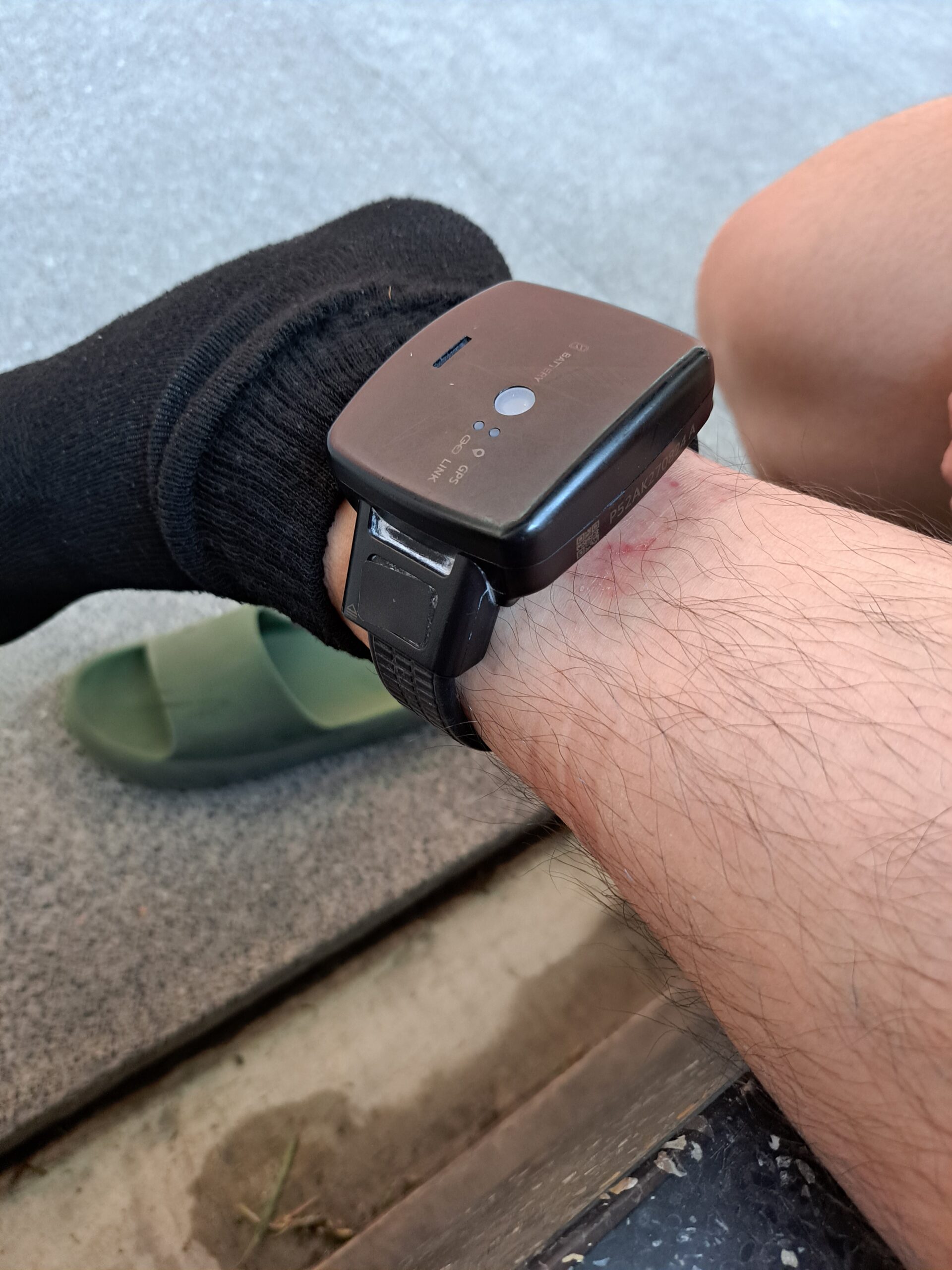
Although Kiattichai’s trial is yet to begin, he is under constant surveillance. The EM has not only affected his freedom of movement, it has also, and most severely, affected his physical and mental health.
The left side of Kiattichai’s ankle has become an open wound and has become infected. But the court has so far rejected four official requests to remove the EM device for medical reasons.
“I struggle to walk or run sometimes, but what is really hard for me since I have the EM is to sleep. It hurts a lot when I sleep. The pain wakes me up many times every night and I always feel tired,” he said.
Exercise is out of the question now. He used to go to the gym and play sports, but with the EM device, his physical activity has been suddenly cut off to merely walking from class and to work.
“The EM scratches me and hits my foot bones every time I walk.”
As a young student who has just started his first internship, Kiattichai fears that this accusation along with the order to wear the EM device might be detrimental to his future and his professional career. He also worries that in case the court will find him not guilty, companies will still be reluctant to hire him as he’s seen as a criminal by the state.
“The Thai government should not use this EM anymore in pre-trial political cases. It makes people’s lives much harder; not just during the time you wear it, but also after that. It will always be difficult for us to get a job regardless of the court’s decision,” he said.
2020 protests
In June 2020, hundreds of thousands of Thais took to the streets to call for democratic change. But it was calls for monarchy reform that pushed the authorities to make sweeping arrests and violently crack down on protesters.
According to data collected by Thai Lawyers for Human Rights (TLHR), an organisation which monitors rights violations and gives legal services to activists, between November 2020 and June 2022, more than 200 people have been charged under the lèse majesté law, which carries three to 15 years of prison sentence for those who insult the royal institution.
Parit ‘Penguin’ Chiwarak and Panusaya ‘Rung’ Sithijirawattanakul stood out as two of the most prominent protest leaders at only 22 years old. Now at 24, they both are facing up to 150 years in jail if convicted on all counts under the royal defamation laws for speeches they gave over the course of the protests.
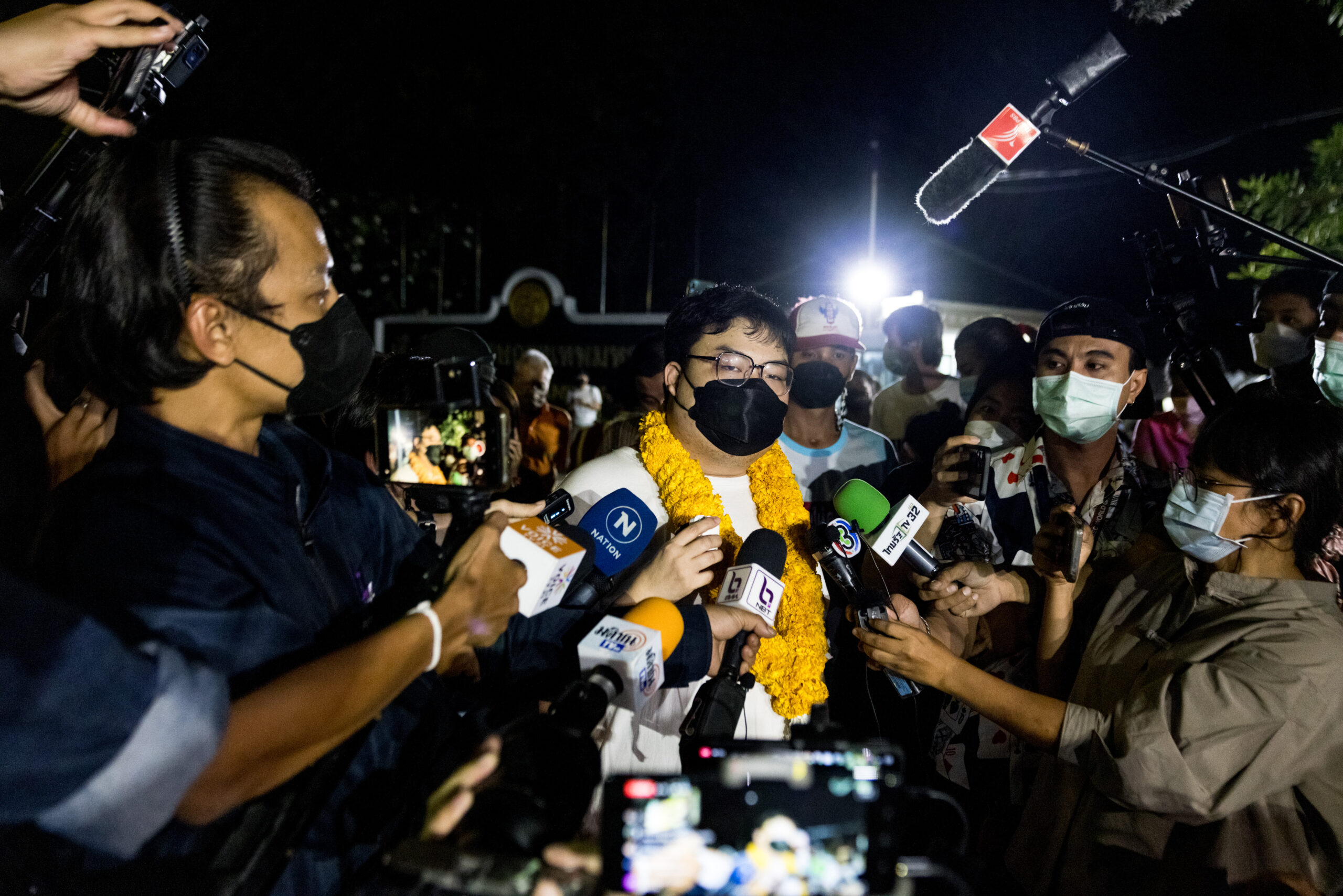
They were first charged in 2020 following the mass demonstrations across the country that saw gatherings of around 300,000 people in total. They were arrested and, weeks after, released on bail under pressure from international human rights organisations. They are each facing more than 20 counts, including royal defamation, incitement, violation of emergency regulations, and unauthorised use of microphones in public.
There are at least 17 activists wearing EM devices across the country. According to a brochure released by the government, the device can be used only on certain groups of individuals, which include those accused of or convicted of drug-related offences, gambling, and causing harm to others.
The purpose of the EM device is to prevent criminals from recommitting the same crimes. But Pathomporn Kaewnoo, a documentation officer at TLHR argues that political prisoners should not be subjected to wearing them.

“The use of EM on political prisoners in pre-trial detention is a human rights issue,” she said, especially for those whose trial has yet to begin.
Parit also argues that the EM devices along with curfews are symbols of power, that reflect the state has full control of their lives.
“They are trying to tell us that their power is in our ankles; the state authority is with us everywhere; they have a constant eye upon us.”
The activists say the EM monitors are “degrading,” and often painful.
Parit and Panusaya are also subject to a strict curfew. While Panusaya must be home from 9 pm to 6 am, Parit, due to his key role in masterminding the demonstrations, is required to return to his apartment by 6 pm, but is forbidden to leave before 6 am.
He often does not have the time to eat dinner out, buy groceries, or even arrive home on time after class. Neither activist is allowed to leave the country to travel.
Parit said, “I almost forgot what a normal life is.”
It’s unclear how long it will take until their trial begins, but their legal representation said it could take years.
“The EM makes me feel like I am in jail, even if I am not physically behind bars,” Parit said. “When I spent 10 months in prison, I saw many people with big heavy chains around their ankles. I was a political prisoner, so I didn’t have it then; but I got chained as soon as they released me on bail.”
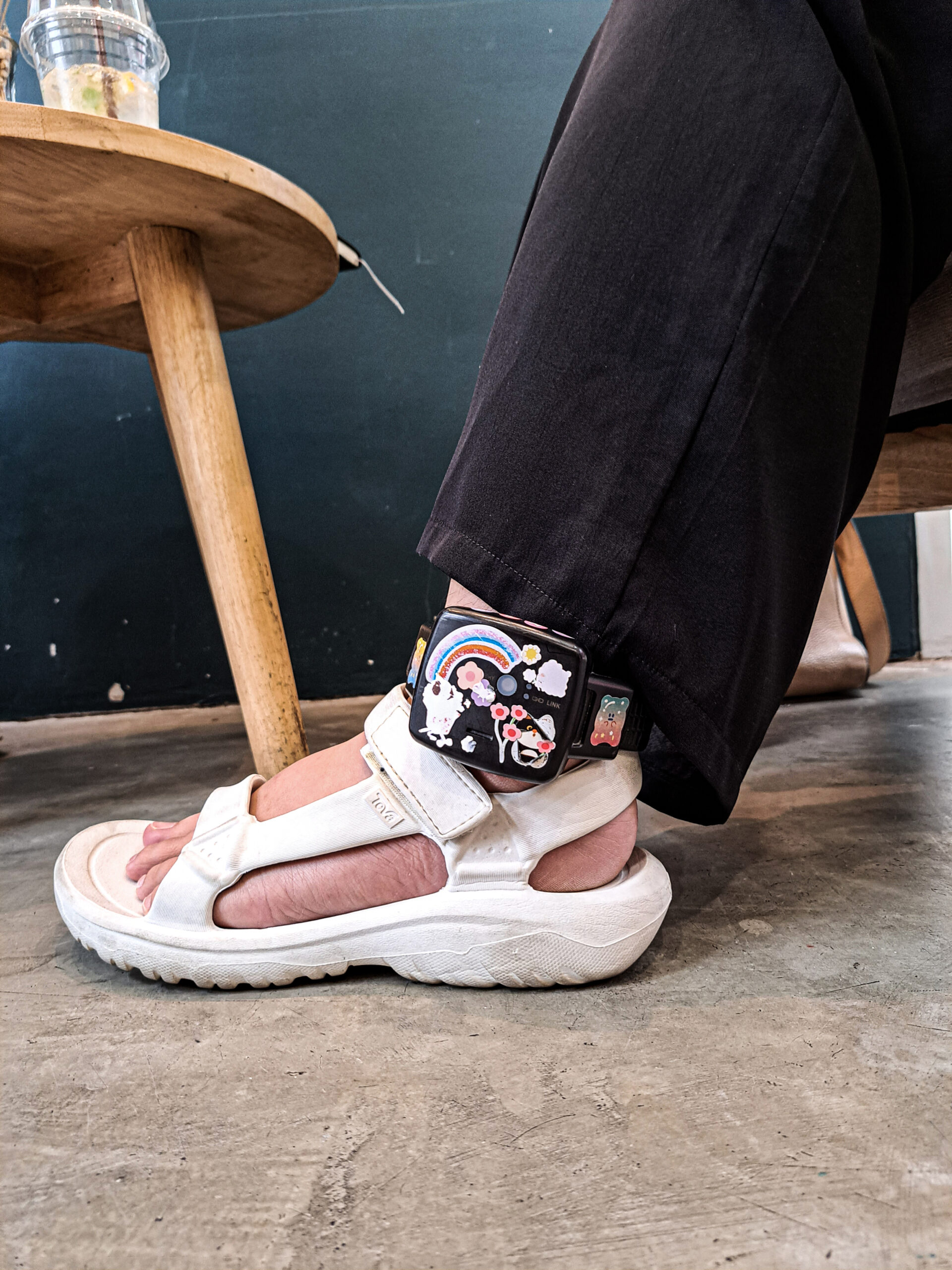
For Panusaya the EM device on her ankle is a symbol to the public that she’s a criminal, yet she still chooses to cope with the stress with a positive approach.
“I decorated my EM with lots of stickers just two weeks ago, when I realised that I might have to live with it for a long time, years probably. I made it just a bit nicer,” she said, smiling.
Violates rights
Experts say that the significant legal burdens imposed on the activists produce psychological harm.
Many of the activists forced to wear the devices are unable to work jobs at night and struggle to provide for their families. This can cause severe psychological pain across the family unit.
“Home becomes a prison not only for the person but also for family members,” Pathomporn said.
Over the past two years, TLHR has submitted several requests to remove EM devices for several individuals suffering from mental distress. But the state only granted removal after the activists attempted suicide, Pathomporn explained.
Lawyers from the TLHR say that the principle of Presumption of Innocence in criminal justice, which is protected by both domestic laws in the Thai Constitution and International law, should protect them. But this is not the case when it comes to the activists.
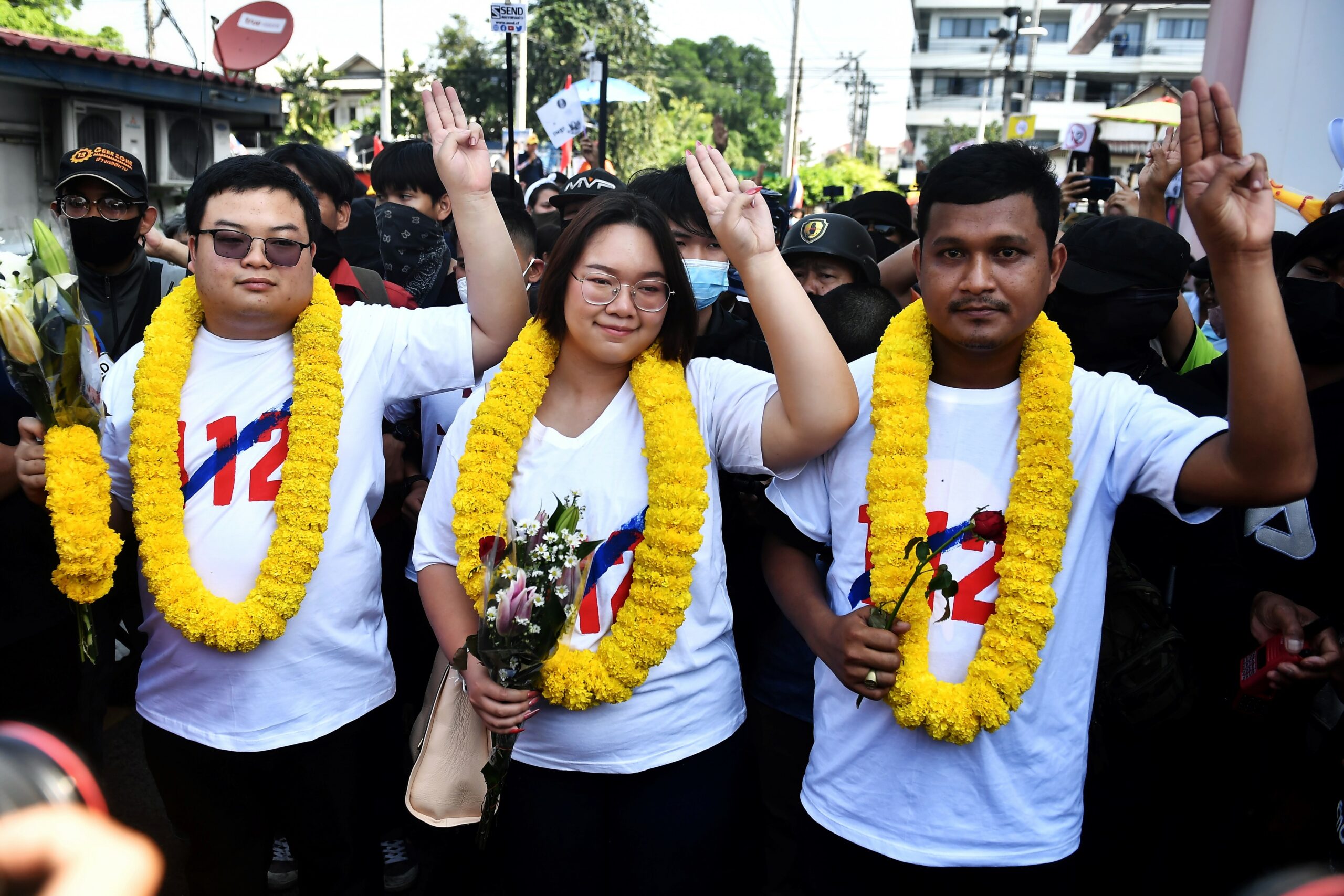
Pathomporn urges the state to no longer “neglect the health of convicted prisoners,” and they should consider the physical and mental well-being of individuals who have not yet been convicted of any crimes.
The Thai government also seems to be using, arguably abusing, the EM devices to suppress people’s freedom of expression, according to Pathomporn. She said this not only violates international law but also basic rights in a civilised country where freedom of association, speech, opinion, and expression are fundamental rights.
Still, Parit expresses a sense of resolve even in the face of years behind bars.
“I am not scared of the future,” he said. “The change is inevitable.”
A hope for change
All eyes are now on Thailand’s upcoming 2023 general elections. The hopes of young activists are placed in the opposition Move Forward Party, but the little trust in the current political system makes them reluctant to believe that a change is really at the door. After multiple failed attempts to remove former coup leader and Gen. Prayut Chan-o-cha from the prime ministerial office, citizens have increasingly lost trust in the government and its leaders, often referring to it as ‘money-politics.’
“Now people kind of lost interest in us, everybody focuses on the election and they kind of forgot about us wearing the EM and those who are in prison,” Panusaya said. “We have been living in silence since the 2014 coup. It’s now time to start speaking up.”
Panusaya dreams of becoming a politician and creating a party that would protect democratic values. Until that moment, she wishes that the world saw what is happening in Thailand as much as it knows what the situation in Myanmar or in Ukraine is.
As she said, “if more people abroad can get more interest in the situation in Thailand, it will be easier for us to fight for democracy. Here lots of people are hurt too. We often get killed or spend our lives in jail for political reasons.”
History is Parit’s passion. He wants to be a historian and expand his research on the ancient Lanna Kingdom, known today as northern Thailand. Before his arrest for royal defamation and incitement in protests, Parit was already cutting out a budding history career.
“Before this series of trials and EM device, I used to go to the north quite often to retrieve some ancient manuscripts for my research and studies. Now I can’t go there anymore. Also, I am not allowed to leave the country, and a lot of historical documents are kept across the border with Myanmar,” Parit explained.
Kiattichai looks to pursue a career in international relations. But given his current accusations under Article 112, he feels his next steps will be to continue his studies for a little longer.
Despite the realm of legal repression they still face today, Panusaya, Parit, and Kiattichai have not lost hope.
“We have hope, time is with us. We will change things,” Panusaya said.
For Penguin, the suppression of their rights is a folly endeavour, one that won’t fundamentally change their views.
“I think it’s silly that the government thinks that an EM device would stop people from thinking or having an opinion,” Parit said. “They can put whatever they want on our ankles, but they can’t change our values and beliefs.”


